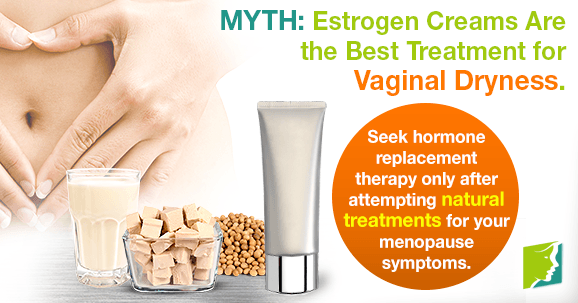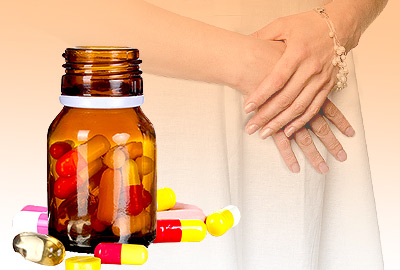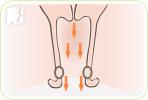Many women find vaginal dryness too personal to discuss, despite it being an affliction that the majority of females experience at some point in their lives. During perimenopause, the lack of open discussion about vaginal dryness is particularly problematic, as women are their most susceptible to the symptom in these years. Vaginal dryness is due to hormonal changes, which thin vaginal tissues during perimenopause and decrease production of vaginal secretion, causing uncomfortable dryness and itchiness. Keep reading for direct advice on choosing vaginal lubricants, and to see the myths and facts about treating vaginal dryness.
MYTH: Estrogen Creams are the Best Treatment
It's commonly assumed that estrogen creams - a form of hormone replacement therapy (HRT) - are a superior means of curing vaginal dryness and re-lubricating the vagina. Although HRT has been praised for its effectiveness in treating a variety of symptoms associated with menopause, it is a drastic form of treatment that's not without risks: the 2002 study by the Women's Health Initiative (WHI) revealed the links between HRT and risk of contracting serious illnesses, including some cancers. For this reason, it is advisable to seek HRT only after attempting natural treatments for your menopause symptoms.
If you favor the idea of boosting estrogen in the body to promote long-term vaginal health, this can be achieved naturally by incorporating phytoestrogens, found in nuts, seeds, and soy products, into your diet.
FACT: Lubricants provide instant relief and enable sex
Vaginal dryness can alter a woman's attitude toward and experience of sex, but conversely, the lubrication that arousal stimulates in the vagina means that regular sex is a natural antidote to dryness. Applying a water-based lubricant to the genitals provides instant lubrication and relief to a dry vagina, will not compromise the effectiveness of condoms or exacerbate the condition further, and will ease discomfort for both partners.
MYTH: Treating Vaginal Dryness is Expensive
This does not have to be true by any means, as affordable over-the-counter moisturizers are widely available. What's more, you probably already have natural lubricants in your home: kitchen staples like olive oil and coconut oil contain high quantities of vitamin E, the healing antioxidant properties of which makes them healthy and effective lubricants to apply topically to the vagina to counter dryness.
FACT: Over-the-counter Moisturizers promote long-term Vaginal Heath
A number of vaginal creams are available to instantly moisturize the vagina, and many contain natural compounds to promote the long-term secretion of lubrication in the vagina. Look for creams containing vitamin E, hydrating compounds (e.g., water), and lactic acids that help restore a healthy internal pH. Look for creams that are hormone-free, fragrance-free, and contain lipids to keep the thinning vaginal tissue supple.
It is important to treat vaginal discomfort with the urgency you would any other body part; if your external skin were dry and painful, you would openly seek treatment to moisturize and nourish it, so you should treat your internal tissues in the same way. Try to wear comfortable, breathable underwear and use lukewarm water when washing intimately, avoiding harsh soaps. Remember that, when in doubt, natural products are the least likely to aggravate dryness and promote the healthy secretion of lubrication in the vagina over time.
Sources
- National Institutes of Health. (2012). Estrogen Vaginal. Retrieved February 12, 2014, from http://www.nlm.nih.gov/medlineplus/druginfo/meds/a606005.html
- National Institutes of Health. (2014). Vaginal dryness alternative treatments: MedlinePlus Medical Encyclopedia. Retrieved February 12, 2014, from http://www.nlm.nih.gov/medlineplus/ency/article/002142.htm




